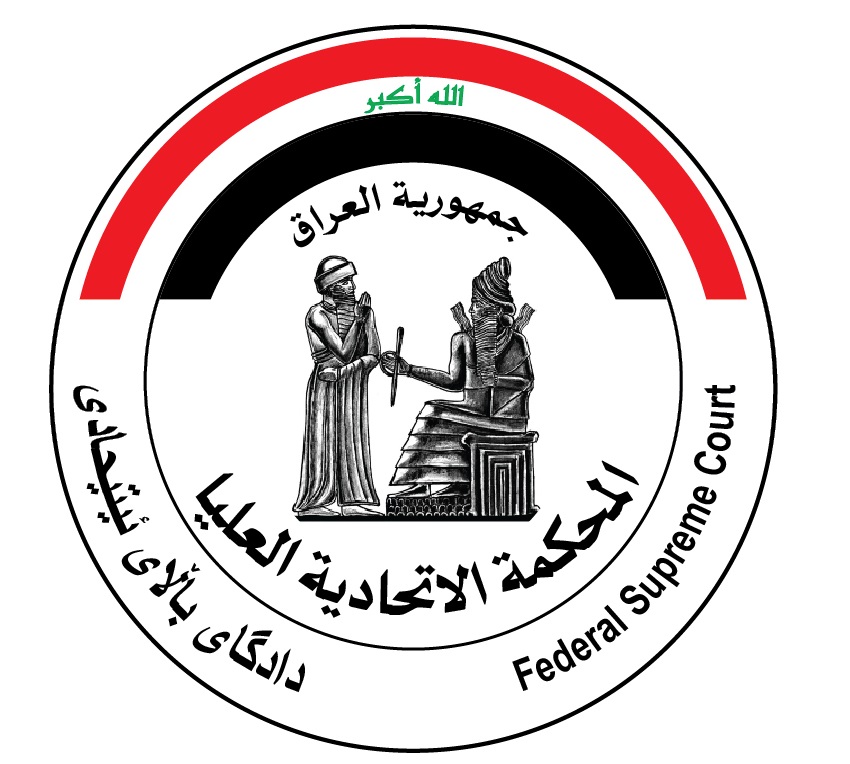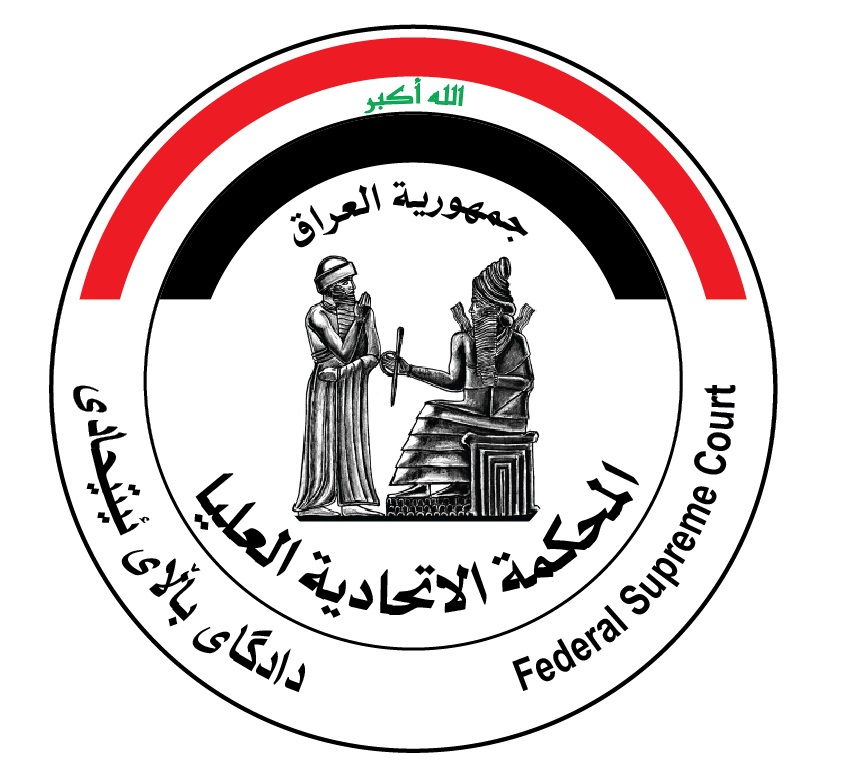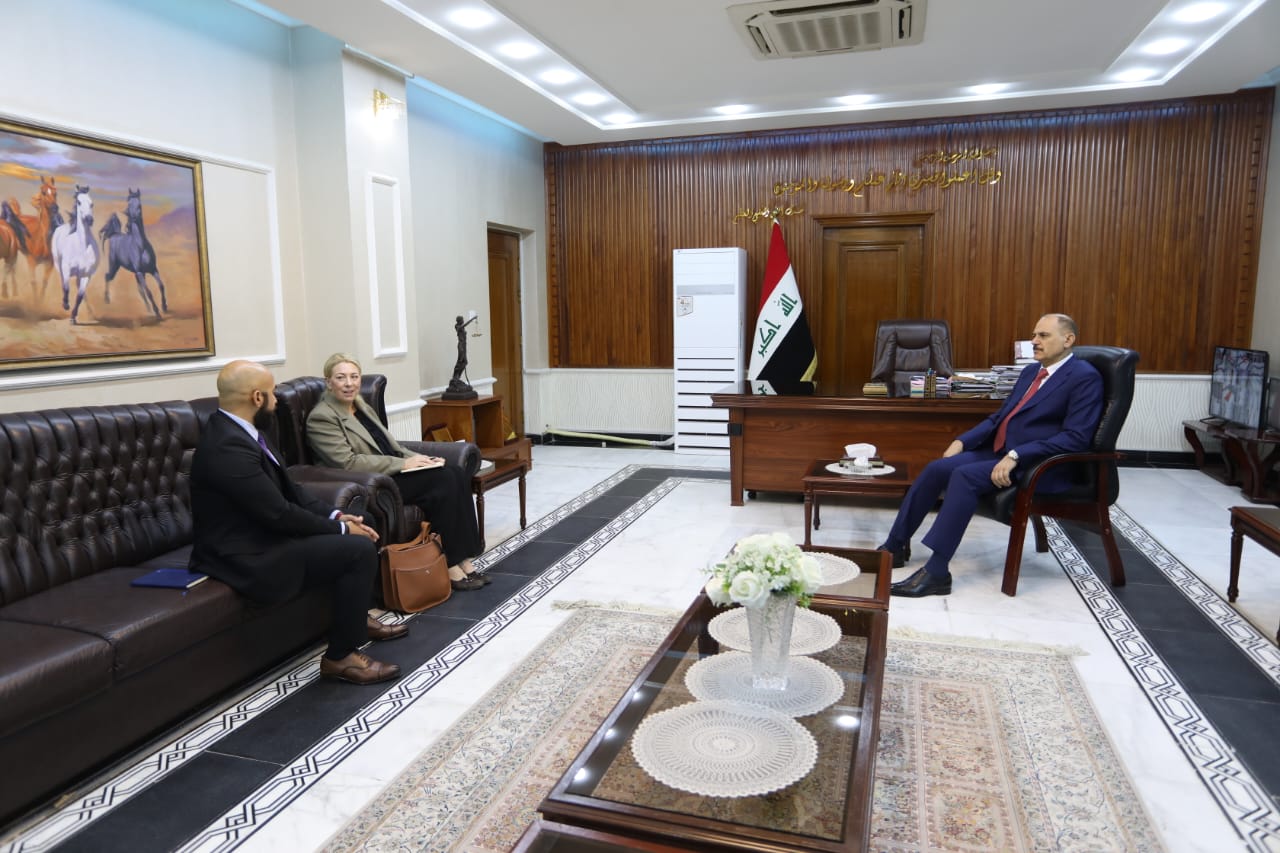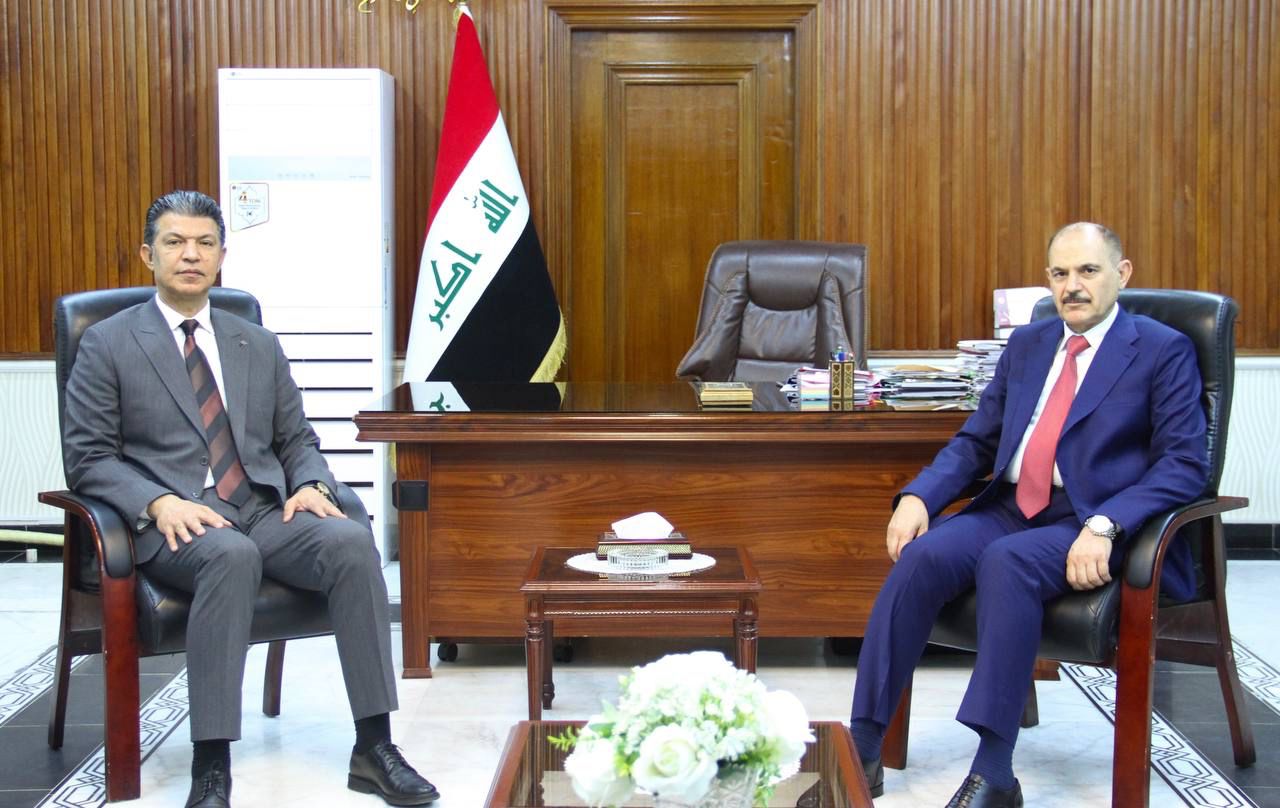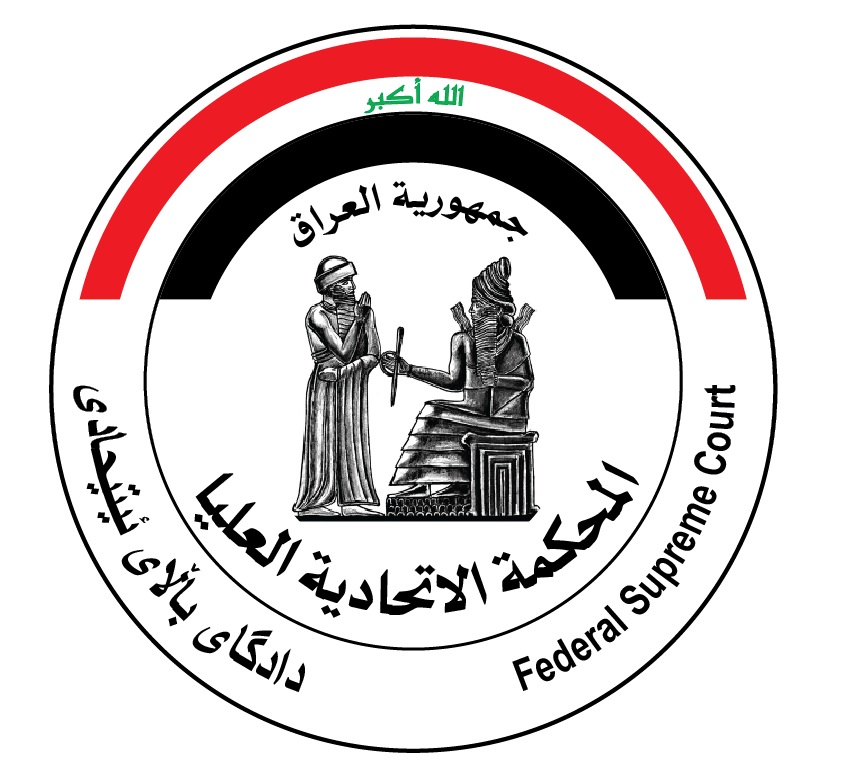
(INA) opens 7 files with the President of the Federal Supreme Court
Baghdad/ Media of the Federal Supreme Court
The President of the Federal Supreme Court, Judge Jassim Muhammad Abboud Al-Amiri, confirmed today, Thursday, that the constitution laid the foundations of the democratic system in Iraq based on the principle of separation of powers and public freedoms, which gave citizens the right to decide their present and future through ballot boxes and the exercise of freedom of opinion, while he praised the government’s success in Holding provincial council elections in a safe and stable atmosphere, he praised the sacrifices of the Iraqis that marked the course of democracy and also considered the martyrdom of Al-Nasr leaders Abu Mahdi Al-Muhandis and Qassem Soleimani to be among the highest levels of humanitarian giving and effort.
Al-Amiri said: “The documents of the constitutions of peoples around the world represent a reflection of human, moral, religious, cultural and educational values and a true translation of all the historical stages that these peoples went through, with their positive and negative aspects, and what the peoples suffered from the tyranny of tyrannical rulers who weakened them, plundered their wealth, and insulted their values and principles, as well as what they suffered during the period of occupation.” What I was exposed to is foreign, as the occupier’s goal is to control and create internal strife and divisions among the people of one nation for national, sectarian, or sectarian reasons, and to seize its wealth.”
He added, "These constitutions also represent a reflection of the jihad carried out by these living peoples and nations, whether against the tyrannical ruler or against the occupier who disdains values and principles. These documents also highlight the bright sides of these nations and the great sacrifices their children have made that have watered their homelands with the blood of martyrdom and redemption." And sacrifice and that blood has become the basic values on which the present and future of peoples are built.”
Constitution of Iraq
He continued, "The Iraqi Constitution effective in 2005 represented a birth in which the suffering of the Iraqi people was embodied in a past in which an individual dictatorial regime controlled the reins of power and violated the values, principles, and blood of the Iraqi people, while in its present it represents the sacrifice made by the people in their fight against terrorist gangs represented by Al-Qaeda and ISIS."
He stressed that "the Iraqi constitution is a very important document that contains meanings that are consistent with this country's past, present and future. It represents an ideal model for all constitutional documents existing in countries of the region and includes important principles. In its first article, it stipulates that the Republic of Iraq is a single, independent federal state with full sovereignty. Governance is a democratic, representative republic, and the constitution guarantees the unity of Iraq,” indicating that “this system of government defines the federal authorities and their powers, which are exercised based on the principle of separation of powers, and that this separation is based on integration and cooperation in a way that serves state building.”
Provincial council elections
Regarding the recent local elections, Al-Amiri said, “The constitution addressed what concerns the governorate councils in its Article 122, which stipulated that governorates that were not organized in a region be granted broad administrative and financial powers to enable them to manage their affairs following the principle of administrative decentralization. This is regulated by law, and the completion of council elections represents The recent governorates are a message to all countries of the world that Iraq is moving forward according to correct and stable foundations towards building constitutional institutions capable of building the correct democratic system, and these democratic institutions will exercise their constitutional powers.”
He added, "Holding successful elections for the provincial councils and successive electoral elections regularly presents three clear and certain indications, the first of which is that democracy in Iraq is real and not formal. The second is that the Iraqi government, people, and political trends are heading towards the real building of democracy based on freely choosing the representatives of the people. And third, this democracy has ensured the enjoyment of... All members of the Iraqi people, without exception, are entitled to the public rights and freedoms stipulated in the Constitution.”
He pointed out that "the most important impression of these elections among the Iraqi people is that the Independent High Electoral Commission conducted them correctly, and there is praise from everyone for the great success of the government in completing the electoral process in a safe, stable and positive atmosphere."
Regarding the election results and their approval, Al-Amiri explained that “the Federal Supreme Court is not competent to approve the final results of the provincial council elections and is only concerned with approving the final results of the Iraqi Council of Representatives elections.”
Services Government
He stressed that "the current Iraqi government is heading in two directions that the Iraqi people have touched on. The first is providing services and completing large, medium, and small projects that the people need and have been waiting for for a long time. This confirms the seriousness and determination of the government to move towards providing services, while in the other direction, the government is keen on the necessity of integration." In the democratic construction of Iraq.
The right of the people to choose their representatives
Al-Amiri continued, “The democratic process in Iraq is being renewed on the basis of the principle of periodic elections, which is embodied in the elections for the House of Representatives and the provincial councils, and depends on the people being the source of authorities and having the right to choose their representatives through secret ballot, which brings about successive changes of governments after each parliamentary election, which confirms the periodicity of elections in the process.” “Electoral elections and the government’s completion of the local elections confirms its keenness to complete the democratic construction.”
The President of the Federal Supreme Court pointed out that “the democratic experience in Iraq based on periodic elections that guarantee the participation of the people in determining their fate and future can be considered an ideal model in the region, and we believe that there is no democratic system like the one in Iraq in the Middle East region, and this is a great achievement that would not have been achieved.” If it were not for the blood of the Iraqi martyrs and the sacrifices made before and after 2003, the blood of the martyrs would be used to strengthen the democratic system based on equality, equal opportunities, and a fair distribution of wealth among Iraqis without exception, regardless of nationality, sect, or any other reason.”
Victory leaders
Regarding the martyrs, the leaders of victory and the martyrs of Iraq, Al-Amiri said: “The Iraqi people made very great sacrifices in their struggle against the previous tyrannical regime that contributed to the removal of the regime, as well as in its war on terrorist gangs. Without this blood, Iraq would not have been able to reach the stage of stability that it is currently experiencing and write for the democratic process success also considering “the martyrdom of the two great leaders, Abu Mahdi Al-Muhandis and Qassem Soleimani, as representing the highest levels of giving, humanitarian effort, sacrifice, redemption, and the struggle against injustice, terrorism, tyranny, and what is not consistent with noble human values, and this blood, with its generosity, is what liberated the lands of Iraq from terrorism.”
The democratic experience in Iraq
Al-Amiri stressed that "the events that Iraq had previously witnessed greatly affected the process of building the state, reflected badly on the administrative system, and allowed the emergence of corruption, both financial and administrative."
He continued, "Many countries are trying to belittle the democratic experience in Iraq for one reason or another," stressing that "Iraqi democracy is measured based on free and fair elections and guaranteeing the rights and freedoms enjoyed by the Iraqi people, who enjoy freedom of thought and belonging, including politics and freedom of the press." The freedom to demonstrate, assemble, express opinions, and criticize the government and Parliament, provided that order, security, public morals, and the nature of the democratic system are not disturbed. These achievements were achieved thanks to the sacrifices of Iraqis who were deprived of them during the dictatorial regime.”
He stressed that "Iraq was able, based on what was stated in the constitution, to build constitutional institutions accurately, represented by the government, parliament, judiciary, the federal court, the Independent High Electoral Commission, the Integrity Commission, the Central Bank, and the Media and Communications Authority, in addition to the rest of the constitutional institutions. These institutions are independent federal constitutional and are not authorities because the federal authorities are Defined under Article 47 of the Constitution as legislative, executive, and judicial.
